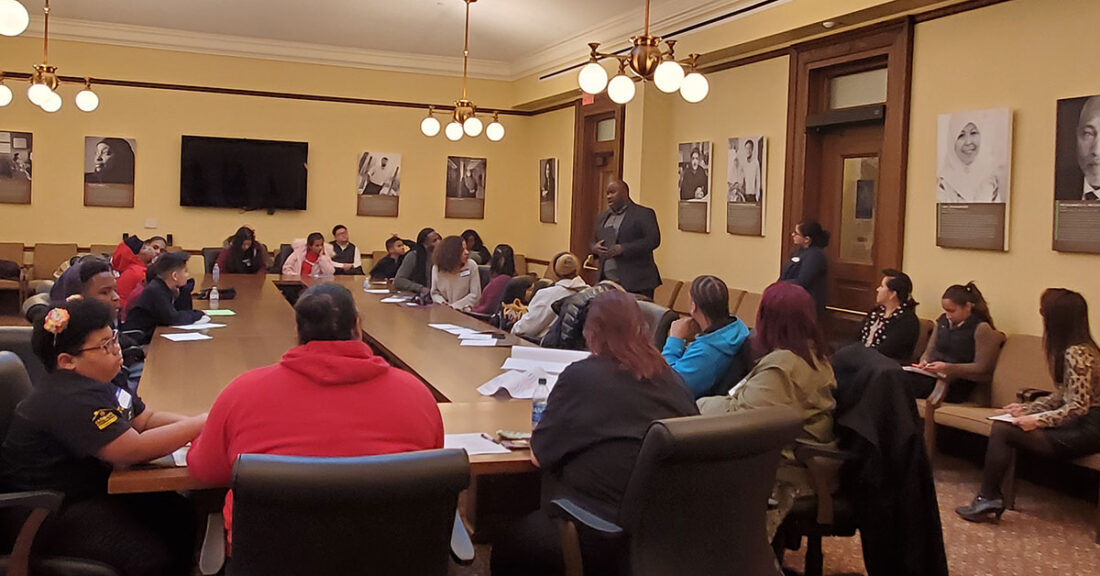Fellows Collaborate to Strengthen Family Financial Stability in Minnesota

Photo provided by the Children’s Defense Fund-Minnesota
A public official, a community service provider and a child advocate — all members of the 2019–2021 class of the Annie E. Casey Foundation’s Children and Family Fellowship® — have been working together to strengthen the financial stability of families and youth in Minnesota, particularly people of color, who disproportionately experience poverty in the state.
Muneer Karcher-Ramos, director of the City of St. Paul’s Office of Financial Empowerment; Kristine Snyder, director of Learn and Earn to Achieve Potential (LEAP)™ at Project for Pride in Living in Minneapolis; and Bharti Wahi, executive director of the Children’s Defense Fund-Minnesota (CDF-MN), approach child and family poverty from different vantage points and with different strategies. Yet they have in common a deep immersion in Casey’s Results Count® leadership framework and the shared experience of applying its skills and tools to improve outcomes.
“The Fellowship has allowed us to think about our individual work and how we can work with each other, provide peer support to each other and get feedback in real life and in a real context,” says Wahi, “And that has been exciting.”
The COVID-19 Recession
The economic hardships of the COVID-19 pandemic and the devastating effects on young people of color making low wages was the defining context for the three Fellows’ collaboration. At the beginning of the pandemic, Snyder and Wahi worked together to secure unemployment insurance for young people still completing their high school education who had lost their jobs. In Minnesota, young people can remain in high school until age 21, but students are not eligible for unemployment insurance. “The quick fix,” says Snyder, “is to drop out of school.”
What she initially thought would be a quick policy change to prevent such an undesirable outcome became a larger campaign involving Wahi at CDF-MN, community partners and youth leaders. “We now are in the process of getting the law changed,” says Snyder. “That was a collaboration that wouldn’t have happened without the Fellowship.”
Karcher-Ramos mapped out the legal and political path for the City of St. Paul to use federal stimulus funds for the People’s Prosperity Guaranteed Income Pilot, which is providing 150 families with $500 per month over 18 months. Snyder and Wahi have joined the pilot’s circle of advisors to provide their expertise and insights.
Karcher-Ramos and his office also have worked with Wahi and CDF-MN to ensure that families participating in the guaranteed income pilot do not lose their eligibility for other public benefits because of increased income. CDF-MN, which has developed an indicator for analyzing the interaction of wages with public benefit programs, is providing training and technical assistance to Karcher-Ramos’s team of benefits counselors.
Karcher-Ramos also strategized with Snyder about how to apply the policy rationale to the use of stimulus dollars at the programmatic level in Hennepin County and the city of Minneapolis. Snyder was able to secure federal funds for a much-needed $1,500 cash transfer to 128 youth aging out of foster care.
Contributing Wisdom and Knowledge
The work of the three Fellows has been strengthened by their collaboration with Vinodh Kutty, a member of the 2007–2008 Fellowship class. A longtime Hennepin County official who has worked on equity issues in public systems, Kutty has helped the Twin Cities’ Fellows step back from their day-to-day work and survey the political landscape for transformative change. “There are only four of us in the metro area,” says Snyder, “but we definitely collaborate and coordinate.”
Karcher-Ramos, Snyder and Wahi are now transitioning from their Fellowship class into the Casey Fellows Alumni Network, which helps the 140 leaders who have participated in the fellowship stay connected. “The alumni are an important part of our Casey Family,” says Leslie Boissiere, the Foundation’s vice president of external affairs. “We call on them to contribute their wisdom and knowledge to our efforts to improve equitable outcomes for children, families and communities.”






